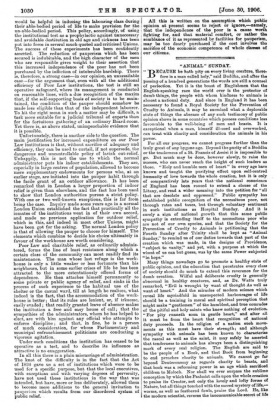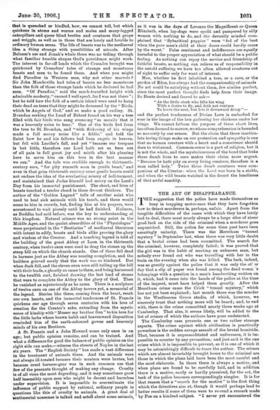"ANIMAL" SUNDAY.
" BECAME he bath pity on every living creature, there- fore is a man called holy," said Buddha, and after the passing of a hundred generations the words are still a counsel of perfection. Yet it is the boast of Englishmen that the English-speaking race the world over is the protector of dumb things, the people with I'vhoni kindness to animals is almost a national duty. And since in England it has been necessary to found a Royal Society for the Prevention of Cruelty to Animals, it may be surmised what a deplorable state of things the absence of any such testimony of public opinion shows in some countries which possess conditions less favourable to the well-being of men and beasts. It is exceptional when a man, himself ill-used and overworked, can treat with charity and consideration the animals in his power.
For all our progress, we cannot progress further than the truly great of any bygone age. Beyond the purity of a Buddha or the tenderness of a St. Francis of Assisi it is impossible to go. But much may be done, however slowly, to raise the masses, who can never reach the height of such leaders as those. " Holy and humble men of heart " in every age have known and taught the purifying effect upon self-centred humanity of lore towards the whole creation, but it is only of comparatively late years that' the national conscience
of England has been roused to extend a clause of the Litany, and read a wider meaning into the petition for "all that are desolate and oppressed." Public sympathy has established public recognition of the necessitous poor, not through rates and taxes, but through voluntary sentiment in such institutions as Hospital Sunday. And it is surely a sign of national growth that this same public sympathy is extending itself to the necessitous poor who are not of our own species, and that the Society for the Prevention of Cruelty to Animals is petitioning that the Fourth Sunday after Trinity shall be kept as "Animal Sunday," to remind us of our duties towards that part of the creation which was made, in the designs of Providence, " subject to vanity," and yet, with a purpose at which the wisest of us can but guess, was by the same Power subjected "in hope."
Many things nowadays go to promote a healthy state of public opinion, and the education that penetrates every class of society should do much to extend this reverence for the dumb creation. Wilful and deliberate cruelty is generally abnormal in healthy creatures, and, as Dr. Watts truly remarked, "Evil is wrought by want of thought As well as want of heart." And the miracles of modern science which reveal life myriadfold in unsuspected harbourages of life should be a training in moral and spiritual perception that might make " gentlemen" of the humblest, and true comrades of the pitiful and holy saints who knew nothing of evolution, " For pity runneth soon in gentle heart," and after all it must be from the heart that recognition of national duty proceeds. In the religion of a nation such move- ments as this must have their strength ; and although sympathy with animals has been known to characterise the rascal as well as the saint, it may safely be asserted that tenderness to animals has always been a distinguishing mark of every real religion. The English are said to be the people of a Book, and that Book from beginning to end preaches charity to animals. We cannot go far beyond Deuteronomy as regards charity to beasts, and that book was a reforming power in an age which sacrificed children to Moloch. Nor shall we ever surpass the sublime conception by which the Psalmist calls upon the whole creation to praise its Creator, not only the lovely and lofty forms of Nature, but all things touched with the sacred mystery of life,— worms, as well as feathered fowls, praise the Lord. He, like the modern scientist, reveres the incommunicable secret of life
- that is quenched or kindled, how, we cannot tell, but which quickens in atoms and worms and moles and many-legged caterpillars and queer blind beetles and creatures that grope and wriggle, as well as in those that are lovely and lovable to ordinary human sense. The life of beasts was to the mediaeval idea a thing strange with possibilities of miracle. After Balaam's ass and Jonah's whale there was no telling through what familiar humble shapes God's providence might work. The interest in far-off lands which the Crusades brought was quickened by Crusaders' tales of strange and monstrous beasts and men to be found there. And when you might find Paradise in Western seas, why not other marvels P Sir John Mandeville had tales of beasts no less monstrous than the folk of those strange lands which he declared he had seen. "Of Paradise," said the much-travelled knight with admirable modesty, " cannot I well speak, for I was not there " ; but be told how the folk of a certain island were used to hang their dead on trees that they might be devoured by the " Birds, which be Angels of God," and so make a good ending. St. Brendan seeking the Laud of Behest found on his way a tree filled with fair birds who sang evensong "so merrily that it was a heavenly noise to hear." One of the birds fled from the tree to St. Brendan, and "with flickering of his wings made a full merry noise like a fiddle," and told the Saint how he and his fellows bad been angels in heaven, but fell with Lucifer's fall, and yet " because our trespass is but little, therefore our Lard bath set us here out of all pain in full great joy and mirth after his pleasing here to serve him on this tree in the best manner we can." And the tale was credible enough to thirteenth- century ears, " for pity runneth soon in gentle heart," and even in that grim thirteenth century some gentle hearts could not endure the idea of the everlasting misery of bell-torment, and maintained that Judas himself had mercy on the Lord's Day from his immortal punishment. The short, sad lives of beasts touched a tender chord in these devout thinkers. The author of the " Golden Legend" tells of another saint who used to heal sick animals with his touch, and these would come to him in crowds, but, finding him at his prayers, were accustomed to wait piously until he had finished. Holiness, as Buddha bad said before, was the key to understanding of this kingdom. Natural science was no strong point in the Middle Ages, and the quaint absurdities of the "Physiologus" were perpetuated in the " Bestiaries " of mediaeval literature with intent to edify, beasts and birds alike proving the glory and wisdom of the Creator. And a touching legend is told of the building of the great Abbey at Leon in the thirteenth century, when twelve oxen were used to drag the stones up the steep hill on which the church stands. One of these fell dead in harness just as the Abbey was nearing completion, and the builders grieved sorely that the work was so hindered. But when dusk fell, and the eleven oxen were still toiling up the bill with their loads, a ghostly ox came to them, and being harnessed to the twelfth cart, finished drawing the last load of stones that were to complete the Abbey to the glory of God. Then be vanished as mysteriously as he came. There is a sculpture Of twelve oxen on one of the Abbey towers yet, a memorial of the legend. Stories like these, coming from the heart, reach our own hearts, and the immortal tenderness of St. Francis quickens our age through seven centuries with his love of creation for the Creator's sake, extending from the mystic sense of kinship with" Messer my brother Sun" to his love for the little larks whose brown habit and heavenward disposition reminded him of the earth-coloured gowns and heavenly minds of his own Brothers.
A St. Francis and a John Howard come only once in an age; but public opinion remains, and can be trained. And what a difference for good the balance of public opinion on the right side can make,—witness the streets of Naples in the last six years. The " English Society " has made a vast difference in the treatment of animals there. And the animals were not always ill-treated because their masters were brutes, but because cruel harness-gear was in such common use that few of the peasants thought of making any change. Cruelty is of all vices the most degrading, and it may sometimes grow half insensibly upon men who might be decent and harmless under supervision. It is impossible to overestimate the influence of public support by rational, ordinary people in questions like this of cruelty to animals. A great deal of sentimental nonsense is talked and 8,64 about some animals, as it was in the days of Lorenzo the Magnificent or Queen Elizabeth, when lap-dogs were spoilt and pampered by silly women with nothing to do, and the devoutly minded com• plained that " Sybaritical puppies " were "fed of the best when the poor man's child at their doors could hardly come by the worst." False sentiment and indifference are equally harmful to the proper appreciation of what should be a public feeling. As nothing can repay the service and friendship of faithful beasts, so nothing can relieve us of responsibility in the untold suffering we have too often allowed creatures out of sight to suffer only for want of interest.
Man, whether he first inhabited a tree, or a cave, or the garden of Eden, has always bad the companionship of animals No art could be satisfying without them, few similes perfect, since the most perfect thought finds help from their image. So Dante desired and feared to ask-
" As the little stork who lifts his wing
With a desire to fly, and doth not venture To leave the nest, but lets it downward droop "-
and the perfect tenderness of Divine Love is embodied for ever in the image of the hen gathering her chickens under her wings. We cannot fathom the purpose of these short lives, too often doomed to sorrow, we whose comprehension is bounded so narrowly by our senses. But the claim that these inarticu- late loving things make on our protection and sympathy is one that no human creature with a heart and a conscience should dare to withstand. Common-sense is a part of religion, but it is not the whole, and the mysteriousness of the bond that links these dumb lives to ours makes their claim more urgent. "Because he bath pity on every living creature, therefore is a man called holy." Twice these dumb creatures were com- panions of the Creator : when the Lord was born in a stable, and when the wild beasts watched in the desert the loneliness of that awful sanctity.



























































 Previous page
Previous page